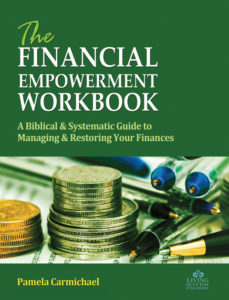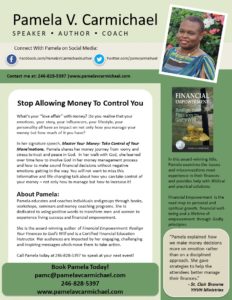5 Ways Money Influences Your Life
Look Deep Into the Heart of Money Matters
“For money to be a valuable resource, you must master it, see its usefulness and use it effectively.” — Pamela Carmichael, Financial Empowerment
Money is personal. Not only does it affect your bank account but it affects your emotions, your outlook on life and how you perceive others including your loved ones. Think about this: If you were to inherit a large sum of money, how would you feel? I am sure you would be elated and not to mention relieved because you have some extra that you can use to do some good, like pay off debts, purchase a house or even take the family on a long desired vacation. On the other hand, if you were to incur a big expense or lose big on your investments, how would you feel? Yes, the feeling anyone would have is worry or stress over how you can deal with that kind of financial setback.
Admittedly, we all experience highs and lows in our emotions based on how things are going financially. Sadly, most of us are stressed because of constant money woes. Financial challenges are known to be the cause of stress-related illnesses due to lack of self-care or much-needed health care, failed marriages, stressed children in families facing financial struggles, poor job productivity, and more.
Identify Your Mone’motions
In this section, you will identify money-related emotions (Mone’motions) that impact how your manage money as well as your wellbeing—spiritual, emotional, mental and physical.
The world places much emphasis on money. The fact is, you cannot do much without the currency. Therefore, you need to be aware of its impact on your emotions—your Mone’motions. Ask yourself the following questions to determine areas of concern in your financial life and where money may be controlling you in some way. Be true to yourself and give honest responses. The more you learn about your mone’motions the better you can master money rather than money control you.
- How do you feel when you have to pay the bills?
- What kind of reaction do you have when there isn’t enough to cover an unexpected expense?
- When there isn’t enough money to make it through the month what do you do (e.g. worry constantly, stay awake at night, pray for wisdom on how to manage, etc.)?
- Do you identify with this statement: “Money makes my brain hurt!” What is your interpretation of this statement?
- How often do your review your finances? How does having to do this make you feel about your money?
Excellent! Good work in completing that exercise. Now, let us see how these mone’motions have been identified in the Bible and how you can overcome them.
Mone’motions Identified In the Word of God
“What’s your love-affair with money?” This question conjures up at least two reactions: one of curiosity and another of disgust because of course the first reaction is that no one should love money. Even the Bible highlights that individuals can have an emotional connection to money. The unfortunate reality is that money can be such a strong force that we often form a love-hate relationship with it. Your response to money can either be negative or positive.
| NEGATIVE RESPONSE TO MONEY | POSITIVE RESPONSE TO MONEY |
| Love | Hate |
| Loyal | Despise |
| Worry | Peaceful |
| Greedy | Generous |
| Unwise | Smart |
Review these scriptures and indicate the emotional responses to money in each of them.
- No servant can serve two masters; for either he will hate the one and love the other, or else he will be loyal to the one and despise the other.
- You cannot serve God and mammon. — Luke 16:13 (also Matt. 6:24)
- Jesus’ word of encouragement to avoid negative emotions – Matthew 6: 25-34
- And everyone who was in distress, everyone who was in debt, and everyone who was discontented gathered to him. So he became captain over them. And there were about four hundred men with him. — 1 Sam. 22:2
- Elisha vs. Gehazi’s response to the gift offered
- –2 Kings 5:15-27
- The Parable of the Lost Son – Luke 15:11-32
- The Parable of the Rich Fool – Luke 12:13-21
- Jesus Counsels the Rich Young Ruler – Matthew 19:16-30 (also Mark 10:17-31, Luke
- 18:18-29)
- There was a certain man in Caesarea called Cornelius, a centurion of what was called the Italian Regiment, a devout man and one who feared God with all his household, who gave alms generously to the people, and prayed to God always. – Acts 10:1-2
- The Parable of the Unjust Servant – Luke 16:1-12
Your Life & Money Connection
Life happens. That is a phrase we often hear and yes, it is true. In the life happening, money also happens. Either money is something you avoid talking about and don’t like to deal with or money is managed by you effectively or you have a neither-here-nor-there attitude about it. Whatever the response, money happens in the midst of life.
Unfortunately, any negative attitude or emotion to money leads to bad money management that results in negative returns: excessive spending and borrowing. This creates a spiraling effect that brings on more negative feelings about money. You freeze instead of dealing with money matters, hoard excessively, fear losing money or being in want, think limitedly about your ability to earn a greater level of income and so on.
However, you need to combat those negative mon’emotions so you can be free to effectively manage your money. In the previous exercise you looked at mon’emotions identified in the Bible. In this section, you will examine your life journey to see where you may have developed any negative emotions towards money.
Your money story: unpleasant Events
What past experiences have left the proverbial bad taste in your mouth or have hindered you from managing effectively and making timely money decisions? For example, as a child did your family have money struggles or did you make a mistake that cost you a great deal financially and maybe even relationally?
Your Money Influencers
What did you learn from your parents or teachers either directly or indirectly that has a negative impact on your view and management of money today? For example, “Money doesn’t grow on trees” was a statement often said to children to deter them from asking for anything too pricey or out of frustration when money was limited.
What money practice or money perspective do you have now that is a result of your upbringing?
Your Perception Of People And Yourself
We can often make judgments about people without really knowing them. Your preconceived ideas of how someone else makes or manages money (compared to you) is a reflection of your relationship with money. Right now in your life, who do you think has more money than you or seems to be getting ahead faster than you (e.g. co-workers, neighbours, your close friend)? What makes you think of people in that way?
Sometimes you might even have a low view of yourself. For example, you might quickly accept a low salary for a new job and not ask for the amount the position requires. Or as a business owner you might find yourself bidding low on a contract hoping that you would win it. Do you ever think you can earn more than you currently do? How do you feel when thinking like this?
Your Lifestyle: Current And Future
Life goals, lifestyle choice, current income and your perceived or projected income and expense levels influence how you manage your resources. What other influences in your life have impacted how you manage your money? For example, consider how your co-workers, your neighbours, family members and friends have influenced you financially.
Along with the immediate influences, there are others to consider. What has the impact of the internet, social media and advertising from various forms such as magazines, radio, and television been on your view of money and how you use money?
The above is an excerpt from The Financial Empowerment Workbook: A Biblical & Systematic Guide to Manage & Restore Your Finances. Get a paperback copy from Amazon or an electronic version (pdf) from Gumroad.
5 Ways Money Influences Your Life Read More »














